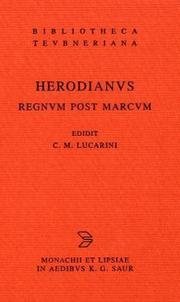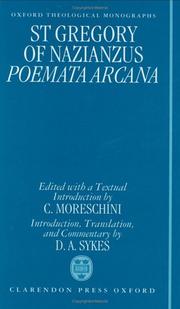| Listing 1 - 10 of 13 | << page >> |
Sort by
|
Book
ISBN: 9783110173086 3110173085 9783110297560 3110297566 9783110297577 3110297574 9783110440959 3110440954 Year: 2011 Publisher: Berlin : de Gruyter,
Abstract | Keywords | Export | Availability | Bookmark
 Loading...
Loading...Choose an application
- Reference Manager
- EndNote
- RefWorks (Direct export to RefWorks)
Apologetics --- Theology --- Apologetics. --- Theology. --- History --- Early church. --- 30-600.
Book
Year: 1876 Publisher: Ienae, : prostat in libraria Hermanni Dufft,
Abstract | Keywords | Export | Availability | Bookmark
 Loading...
Loading...Choose an application
- Reference Manager
- EndNote
- RefWorks (Direct export to RefWorks)
Apologetics --- Apologetics --- Apologetics --- Apologetics. --- Theology --- Theology --- Theology --- Theology. --- Early church. --- History --- Early church. --- History --- 30-600.
Book
Abstract | Keywords | Export | Availability | Bookmark
 Loading...
Loading...Choose an application
- Reference Manager
- EndNote
- RefWorks (Direct export to RefWorks)
Christian ethics --- Christian ethics --- Church polity --- Church polity. --- Early church. --- History --- History --- 30-600.
Book
ISBN: 0813232376 Year: 2020 Publisher: Washington, D.C. : The Catholic University of America Press,
Abstract | Keywords | Export | Availability | Bookmark
 Loading...
Loading...Choose an application
- Reference Manager
- EndNote
- RefWorks (Direct export to RefWorks)
Church --- Church history --- Unity --- Clement --- First epistle of Clement to the Corinthians (Clement I, Pope) --- 30-600

ISBN: 3598712820 3110940361 9783110940367 3598712804 9783598712807 9783598712821 Year: 2005 Volume: *416 Publisher: Monachii [Munich] Saur
Abstract | Keywords | Export | Availability | Bookmark
 Loading...
Loading...Choose an application
- Reference Manager
- EndNote
- RefWorks (Direct export to RefWorks)
Herodianus, born around 180 A. D., represents a very important witness for the historical reconstruction of his age. The last critical edition of this author dates back to 1922: it was published by K. Stavenhagen in the Teubner series. Since then there has not been any revision of Herodianus' text; so the edition of Lucarini is a real desideratum in the field of Classical Philology. He has made a new investigation on all the manuscripts which transmit Herodianus' work and he has taken into critical account all the secondary bibliography on it which appeared in the last decades. Herodianus, geboren um 180 n. Chr., gilt als wichtiger Zeuge für die Geschichte seiner Zeit. Die letzte Neubearbeitung wurde in der Bibliotheca Teubneriana 1922 von K. Stavenhagen vorgelegt. Weltweit existiert keine Neubearbeitung des Textes, so dass die Edition von Lucarini von der Fachwelt mit größtem Interesse aufgenommen wurde, zumal er eine neue Durchsicht aller Handschriften vorgenommen und die Literatur der letzten Jahrzehnte zu Herodianus exakt aufgearbeitet hat.
Rome --- History --- Histoire --- Emperors --- Rim --- Roman Empire --- Roman Republic (510-30 B.C.) --- Romi (Empire) --- Byzantine Empire --- Rome (Italy) --- Emperors - Rome - Early works to 1800.
Book
ISBN: 9783110280074 Year: 2012 Publisher: Berlin : de Gruyter,
Abstract | Keywords | Export | Availability | Bookmark
 Loading...
Loading...Choose an application
- Reference Manager
- EndNote
- RefWorks (Direct export to RefWorks)
Apologetics --- Christian literature, Early --- Apologetics --- Apologetics. --- Apologetics --- Christian literature, Early --- Greek authors. --- History --- Early church. --- Greek authors. --- Eusebius, --- De evangelica praeparatione (Eusebius, of Caesarea, Bishop of Caesarea). --- 30-600.
Book
ISBN: 3110297590 9783110297591 Year: 2013 Publisher: Berlin : de Gruyter,
Abstract | Keywords | Export | Availability | Bookmark
 Loading...
Loading...Choose an application
- Reference Manager
- EndNote
- RefWorks (Direct export to RefWorks)
Alte Kirche. --- Church history --- Frühchristentum. --- Kirchengeschichte. --- Kirchengeschichtsschreibung. --- Église --- Historiography --- Primitive and early church --- Historiography. --- Primitive and early church. --- Histoire --- Lucian, --- Lucien, --- Philostorgius. --- Sozomenus, Salaminius Hermias, --- Ecclesiastical history (Philostorgius). --- 30-600.

ISBN: 0198267320 9780198267324 Year: 1997 Publisher: Oxford : Clarendon press,
Abstract | Keywords | Export | Availability | Bookmark
 Loading...
Loading...Choose an application
- Reference Manager
- EndNote
- RefWorks (Direct export to RefWorks)
Christian poetry, Greek --- Theology --- Poésie chrétienne grecque --- Théologie --- Translations into English --- History --- Poetry --- Traductions anglaises --- Histoire --- Poésie --- -Theology --- -Translations into English --- -Christian theology --- Theology, Christian --- Christianity --- Religion --- Greek Christian poetry --- Greek poetry --- Translations into English. --- Poetry. --- Poésie chrétienne grecque --- Théologie --- Poésie --- Christian theology --- Christian poetry, Greek - - Translations into English --- Theology - - Poetry - Early church, ca. 30-600 --- -Christian poetry, Greek
Book
ISBN: 9780674726666 9780674730830 0674726669 0674730836 0674726693 1684170745 9781684170746 Year: 2014 Volume: 28, 29 Publisher: Cambridge (Mass.) Harvard University Press
Abstract | Keywords | Export | Availability | Bookmark
 Loading...
Loading...Choose an application
- Reference Manager
- EndNote
- RefWorks (Direct export to RefWorks)
Maximos the Confessor (580–662) occupies a unique position in the history of Byzantine philosophy, theology, and spirituality. His profound spiritual experiences and penetrating theological vision found complex and often astonishing expression in his unparalleled command of Greek philosophy, making him one of the most challenging and original Christian thinkers of all time. So thoroughly did his thought come to influence the Byzantine theological tradition that it is impossible to trace the subsequent history of Orthodox Christianity without knowledge of his work. The Ambigua (or “Book of Difficulties”) is Maximos’s greatest philosophical and doctrinal work, in which his daring originality, prodigious talent for speculative thinking, and analytical acumen are on lavish display. In the Ambigua, a broad range of theological topics—cosmology, anthropology, the philosophy of mind and language, allegory, asceticism, and metaphysics—are transformed in a synthesis of Aristotelian logic, Platonic metaphysics, Stoic psychology, and the arithmetical philosophy of a revived Pythagoreanism. The result is a labyrinthine map of the mind’s journey to God that figured prominently in the Neoplatonic revival of the Komnenian Renaissance and the Hesychast Controversies of the Late Byzantine period.
Theology, Doctrinal --- History --- Pseudo-Dionysius, --- Gregory, --- Li, Qingzhao, --- Li, Chʻing-chao, --- Li, Tjing Tsjao, --- Li, Tsing-chao, --- Li, Tsʻing-tchao, --- Liqingzhao, --- 李清照, --- 李淸照, --- Li, Yi'an, --- Li, I-an, --- 李易安, --- Yi'anjushi, --- 易安居士, --- Zhao Li, Qingzhao, --- Chao Li, Chʻing-chao, --- 趙李清照, --- Zhao, Qingzhao, --- Chao, Chʻing-chao, --- 趙清照, --- Tsʻing-tchao, Li, --- Criticism and interpretation. --- Women and literature --- Literature --- Theology, Doctrinal - Byzantine Empire --- Theology, Doctrinal - History - Early church, ca. 30-600 --- Pseudo-Dionysius, - the Areopagite --- Gregory, - of Nazianzus, Saint
Book
ISBN: 9783110201383 3110201380 Year: 2008 Publisher: Berlin : Walter de Gruyter,
Abstract | Keywords | Export | Availability | Bookmark
 Loading...
Loading...Choose an application
- Reference Manager
- EndNote
- RefWorks (Direct export to RefWorks)
Huns --- History --- Priscus, --- Attila, --- Criticism, Textual --- Rome --- Criticism, Textual. --- Hunni --- Ethnology --- Mongols --- Turkic peoples --- Priskos, --- Atilʹ Khaan, --- Atila, --- Atili Qaġan, --- Attyla, --- Ėtzel, --- Rim --- Roman Empire --- Roman Republic (510-30 B.C.) --- Romi (Empire) --- Byzantine Empire --- Rome (Italy) --- Huns - History - Early works to 1800 --- Priscus, - active 5th century - Criticism, Textual --- Attila, - -453 --- Rome - History - Empire, 284-476 - Early works to 1800 --- Priscus, - active 5th century
| Listing 1 - 10 of 13 | << page >> |
Sort by
|

 Search
Search Feedback
Feedback About UniCat
About UniCat  Help
Help News
News